Zagreb Secondary Scools to Switch to Online Classes as of Dec 14
ZAGREB, Dec 7, 2020 - Secondary schools in Zagreb will switch to online classes as of Monday, December 14, the head of the city department for education, Ivica Lovric, confirmed on Monday.
Partial results of a preliminary testing of students and teachers in 19 Zagreb schools were presented at a regular press conference of the City of Zagreb's civil protection team.
Slightly more than 2,000 Zagreb secondary school students were tested, and preliminary results show the presence of asymptomatic infection in 1% of primary school and 2.23% of secondary school students. As for school workers, 365 were tested, and 3.29% have an asymptomatic infection.
"This confirms that students are not mass carriers of COVID and that the virus is not spreading in classes and schools," Lovric said. "In 75% of Zagreb classes with COVID, only one student is positive, and in others two. We have concluded that it would be good to introduce Model C for all secondary school students as of December 14," he added.
Model C refers to distance learning.
"This will indicate how much that measure will contribute to curbing the spread of COVID," he said, noting that it would surely contribute to reducing crowds in public transport.
Minister Says No Switching to Online Classes
ZAGREB, November 16, 2020 - Education Minister Radovan Fuchs has said that his ministry is still of the view that one should not switch to online classes except in cases when the situation in a school requires it and when physical classes are not possible.
"The ministry has been monitoring the system of primary and secondary schools and still considers that one should not switch to online classes except when the situation in an individual school requires it," the minister said, adding that online classes so far had been introduced in schools where the teaching and auxiliary staff had been reduced to such an extent that it had brought the holding of physical classes into question.
"We have been monitoring the situation closely and will act accordingly but one should not resort to any panicky decisions because that is the worst scenario," he said.
He noted that no country had closed schools without applying stricter general measures and that there were cases where very stringent restrictions were in force but where schools functioned normally.
1,366 students, 549 school staff positive for coronavirus
The minister said that the latest data showed that 1,366 students and 549 school staff were positive for coronavirus, which was 81 fewer students than on Sunday, when a slight decrease was recorded also in relation to Saturday, and that the latest data also showed that 34 fewer teachers were positive for the virus.
"If the current trend stays, it will be good. We can't speak of an abrupt decline, but we can say that the curve is relatively flat," he said.
Universities Can Switch to Online Lectures Within 24 Hours, Says Minister
ZAGREB, November 9, 2020 - Science and Education Minister Radovan Fuchs said on Monday that the epidemiological situation in the education system was relatively good and that universities could switch to online lectures within 24 hours.
The situation at Croatian universities is relatively good today, however, in case of any request to switch to online, I can say with full responsibility that all universities and its components are prepared to go online within 24 hours, Minister Fuchs said.
Sending a larger number of students home could additionally increase the spread of the virus
It is necessary, however, to estimate whether switching to online lectures will bring the desired results, primarily, to reduce the pressure on the health system as sending a larger number of students to their homes because as many as 20,000 students studying in Zagreb come from outside Zagreb, could increase the spread of the virus.
The situation is not dramatic for now but if a well-reasoned decision is made that will indicate that that could be effective, we can recommend it (online teaching) to universities in a very short time, he said.
The minister said that some universities have already introduced hybrid approaches to lectures with professors in lecture rooms while students are attend lectures online.
He admitted that it is complicated to transfer some study programmes to online lectures such as at medical schools, schools of dental medicine, faculties of veterinary medicine and so on.
Fuchs presented some data on the coronavirus incidence among undergraduates and university staff and professors.
For instance, the University of Zagreb has registered 235 positive students, which is 0.3% of the total number of its students, and there are currently 90 employees diagnosed with this infectious disease, or 1.2%.
The University of Osijek, for example, has 67 students diagnosed with the disease, that is 0.43% of its student population and 14 employees (0.05%).
The University of Pula has five positive employees and has no data on students as they are attending online lessons.
The situation at schools is a little more stable and we can see that the number of children infected with the virus is falling. On 28 October, there were 1,440 pupils infected with coronavirus in the whole of Croatia, while today that number is 1,119, said Fuchs.
Online Schooling in Croatia 1 Month On: 5 Teacher Views
April 15, 2020 - It is almost a month since online schooling became the new education norm in Croatia. TCN intern Janja Sestak talks to five teachers to understand their perspectives.
Students, professors, even parents - all of them are going through something they have never experienced before. While students enjoy waking up a bit later than usual, they struggle with much more work. While teachers get attacked that they are doing less than usual; some of them have spent 10 hours per day in front of their laptops trying to do their best. While some parents are going insane with their children at home, they message teachers, telling them they can't do the homework because their kid is unbearable.
As I am a student myself, I can say that is true - we do have much more work to do. Then again, we do not go to lectures (and not every single professor holds an online lecture), so I believe we are about the same as before. Most of my professors are doing a fantastic job, and I am grateful for that. Yes, it was a bit confusing at the beginning, but just because it was something new for all of us.
Unfortunately, reading comments on social networks, a lot of people at this time of online schooling, still don't understand what it is like to be a teacher. There are many of them who did not leave the best impression in our heads of themselves, of course. But in this piece, I want to show you what it is like currently to be a teacher - in primary school, high school, and an assistant on faculty, and how are things handled by the headmaster of a primary school.
I spoke to five people, and one of them wanted to remain anonymous. I will start with that person, and I will call him John.
John is a form teacher in primary school, handling two classes at once because there are not enough children to split the class. Maybe you are asking yourself: "How can someone teach children of the second year while at the same time, in the same classroom, there are children from the fourth grade?"
Well, a lot of things are possible here.
One of the very first things John said to me is that this type of schooling is not the solution. "It seems like we are not doing anything because there are lectures on television. What is worse, lectures on television don't match the ones where we stopped."
Teachers who are teaching from first to fourth grade in primary school are not required to hold online lectures. But still, John has made a web page for his pupils and their parents, to make things easier for everybody. He puts all the work material on it, and for now, everything is under control.
My second source is a teacher who also works in primary school, but she teaches the Croatian language to children from fifth to eighth grade. Maja Priher was my teacher, and I chose her for this because I knew she would be honest. I sent her a message saying I'm hoping she is doing fine in these crazy times and whether or not she would be interested in giving me a statement about the online school reality.
I received a message that is a statement in itself: "Hi! Here is total chaos, and I am frustrated with this online school because I spent most of the day in front of my laptop (10+ hours). I barely find time to help my kid with the homework and prepare lunch. And, the spring cleaning is the last thing on my mind. If you don't have too many questions, send them to me. I will find time for you."
I know she is dedicated to her job since I was her student, so I know how she gets things done. But this message left me in shock. In further conversation, she said that it is her responsibility, but also a willingness to read and comment on every single homework she gets from her students. Mrs. Priher checks daily if students saw the task and reminds them if they didn't. "I'm trying to prepare my video lectures, and this requires a lot of time and learning about tools for it." Again, she is not obligated to do video lectures on her own. She wants to give everything not to hold her students back.
I asked her to send me one photo that would suit best to her profession in these terms. She sent me this, with the caption: "The real situation. And me behind it, wrapped into a blanket because I'm cold from so much sitting."
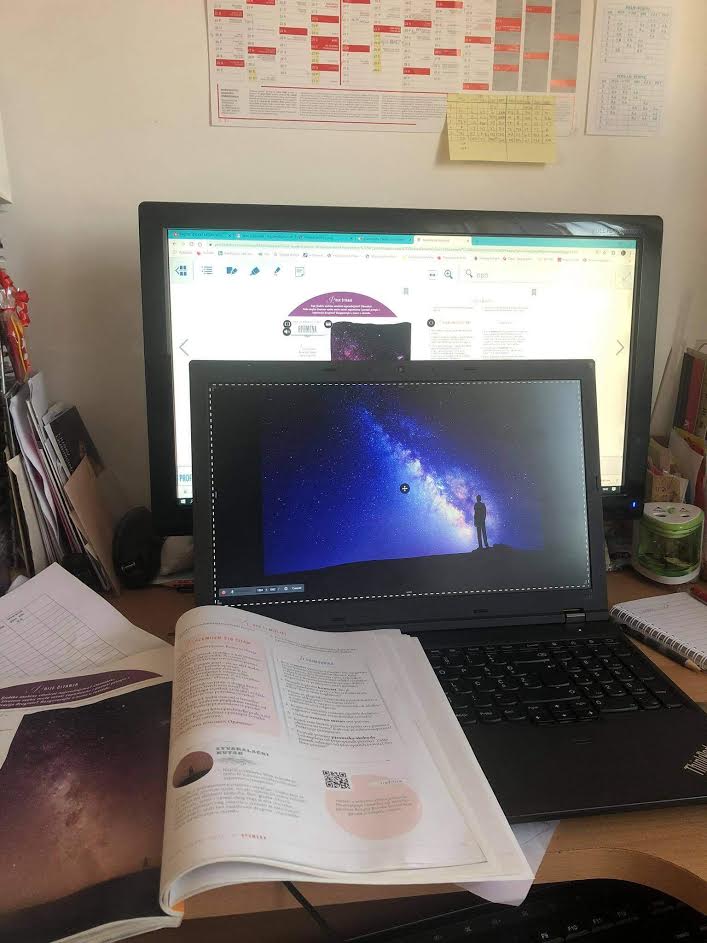
(Photo credit: Maja Priher)
After covering the situation in primary school, let's move to the high school. My source for high school is Cecilija Nekić, a teacher of Italian and Philosophy.
If we leave behind the occasional network problems, according to professor Nekić, the whole system is functionating very well. Professor Nekić says that the transition to online classes was painless. "Everything was done in one day because of the key people from the school who did a great job. Also, I have to mention helpful the parents, who are being understanding and cooperative."
But what she misses the most is the inability to communicate directly with students. "The Socratic method, which consists of well-prepared questions by teachers, leading students to a solution, cannot be implemented," says professor Nekić. Professors tend to send students interactive content, which takes a lot of time. Not only to prepare it but also to find ones that are good enough. Professor Nekić claims that everybody needed some time to get used to the new system, but also, both students and professors understand each other's position.
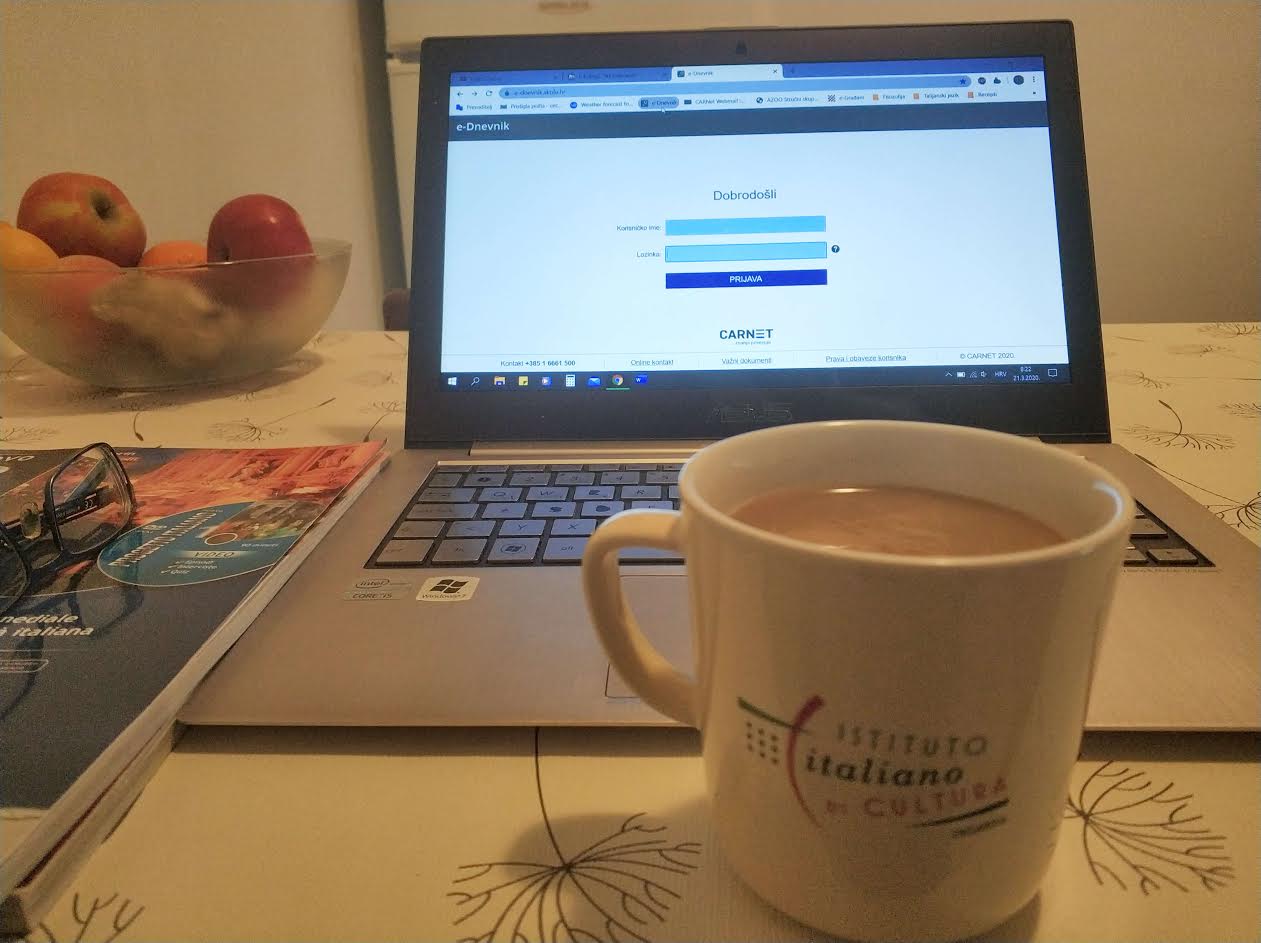
(Photo credit: Cecilija Nekić)
"I often tell my students that the definition of intelligence is the ability to cope with new situations and that this is a real opportunity to practice this premise."
Professor Nekić holds lectures for 250 students, of which six classes are graduate ones, who are now in the biggest panic. Students who are now at the turning point of life told her that they are scared. They are worried that Matura won't be held and that their dream of enrolling in their long-wanted faculty won't happen. They are afraid that they will never return to the classroom with their friends. Professor Nekić tries to calm them down. "I cannot imagine how they feel, but I am always saying to them that we, the teachers, are here for them. I tell them to look at this situation reasonably and rationally, and that it is crucial to maintain a cool head." Also, she advises them to stay away from fake news and to listen to the Ministry.
When asked whether this situation is a good experience or a necessary evil, she answers with something I want to conclude the story from high school. "By no means do I want to underestimate the seriousness of the situation, quite the contrary. I want to emphasize the importance of caring for mental health and drawing attention to the fact that it is our free decision about how we will cope with the same."
After high school, let's see how things look from university. Petra Kovačević is an assistant at the Department of Journalism and Media Production at the Faculty of Political Science at the University of Zagreb and a Ph.D. student at Cardiff University. As one of four lecturers who teaches about Television, she collaborates on courses that are related to the multimedia environment and learning the production of multimedia journalistic forms and exploiting the opportunities of this "virtual" world in the advancement of their journalistic stories.
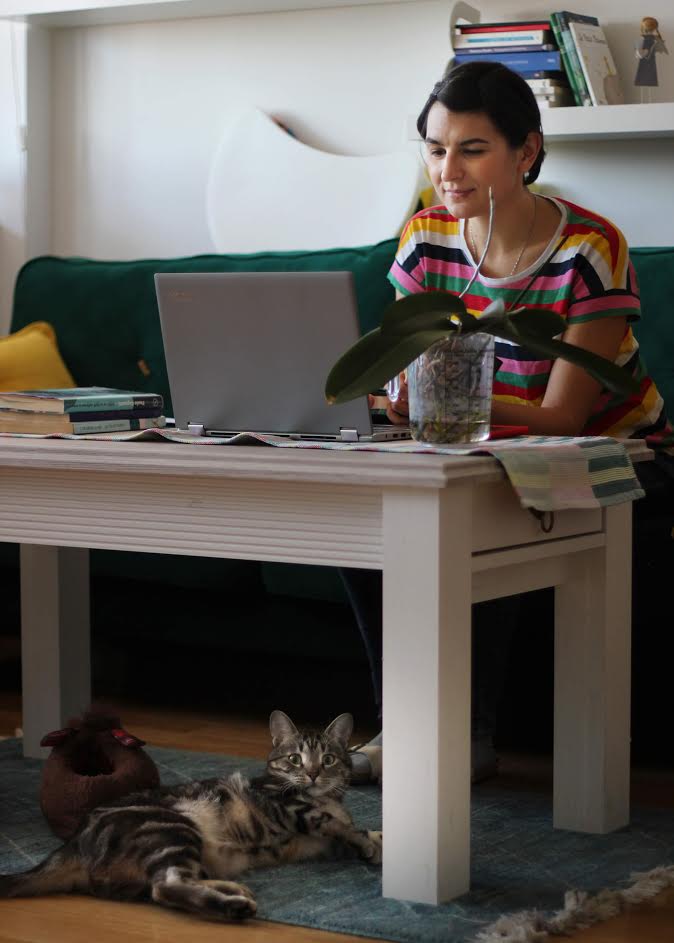
(Photo credit: Petra Kovačević)
She sees this online schooling as a challenge, especially for professors who teach future journalists practical, cognitive, and other skills that are crucial to their profession. "Honestly, this is great for me. I see this as an opportunity for creativity and strengthening one-on-one communication with students."
Besides regular lectures and seminars, she also holds one-on-one Zoom consultations, trying to be the most helpful to her students.
"We came up with a lot of practical tasks for our students so that they can do them with the knowledge they got on regular lectures. This is the way I learned the most while studying Journalism in Cardiff."
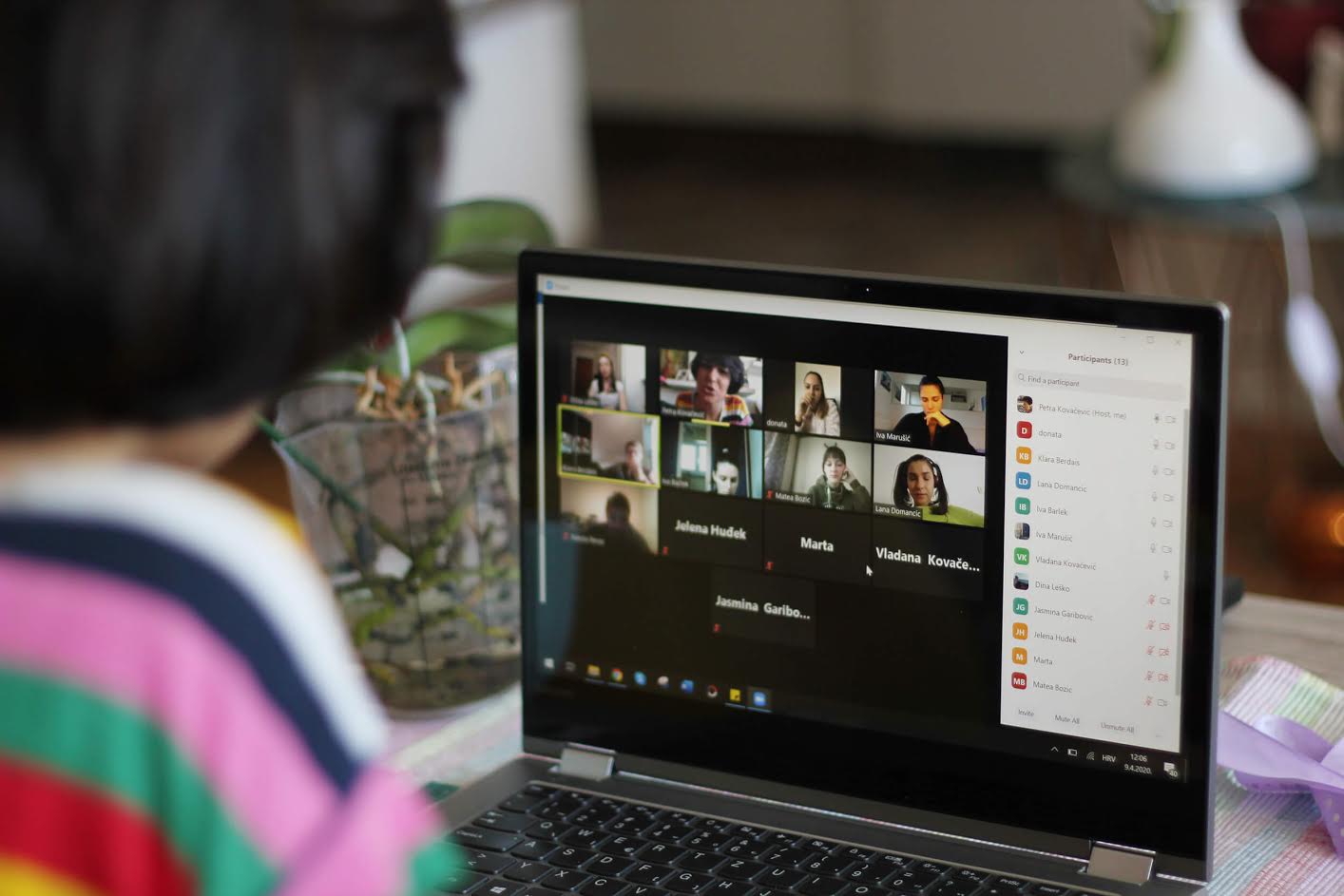
(Photo credit: Petra Kovačević)
Assistant Kovačević believes this is the way students learn the most in a situation like this, but also because students maintain a sense of continuity in fulfilling their obligations. "This means a lot more work for us, professors, but this is fine with me. It is essential that students feel that they are actively traveling towards their destination, that they are concentrated, and less concerned with everything that is happening around us."
She thinks teachers have more responsibility in this process and that they need to think about what is best for their students first. For her, that means transforming the teaching into new circumstances so that students get the same as they did in classical teaching, and maybe even more. "Changes are sometimes good because they stimulate creativity, both for teachers and students. Personally, the well-being of my students is a priority for me. I am fully committed to the task, and it depends on them how much they are prepared to receive."
When it comes to the transition to an online system of schooling, assistant Kovačević agrees with professor Nekić. There was no problem when they already communicate a lot with their students via e-mail or social networks. The only new thing was the Zoom. Assistant Kovačević finds both positive and those less positive sides. "The positive is that we can all see and hear, and the less positive is that you can't 'feel the vibe' in the classroom, the rise or fall of energy, which is very important to me in teaching. Some students never turn on the camera or sound, and sometimes it just means a lot to see and exchange a smile or nod, as we usually can live. I think such small things also mean a lot!"
I asked her for an opinion about those who don't do their obligations. Like students, as do professors. She gave me a humble yet an answer that is worthy of thinking. "Everything a man does; he does to himself."
Assistant Kovačević doesn't think this situation puts knowledge and learning on hold. "Still, it does ask us to be flexible - to ourselves, and especially to students, because they are - for me - first and foremost young people and then my students." Assistant Kovačević sees this as an experience where we all grow together, both professionally and personally.
Lastly, I asked the headmaster of one primary school to share her experience with online schooling. Anđelka Rihatarić explained to me that everything moved online in just one day, as well as that all students and parents were informed about it in a short time. Students from fifth to the eighth year got introduced with MS Team application, the one they use for the virtual classroom, and got their tablets. Thanks to the professor of informatics, Tamara Pofuk, all technical issues were solved.
Lower-grade students watch television classes, which are daily prepared for them by teachers within the School of Life (Škola za život), and their teachers send them additional explanations, materials, assignments, and provide them with feedback on their tasks. This communication goes through the parents - mostly via e-mail or Viber groups. "I have to say that this collaboration is wonderful, quality, cordial both from the teachers and the parents and students. It is a pleasure to watch, and it is, I confess, a spiritual joy how wonderful works, tasks, poems, drawings, recitations are sent by our students."
One of the questions the most people have is how this online schooling will reflect on children who have just started to learn the basics - read, write, build social intelligence, and more. Headmaster Rihtarić gave a positive yet honest opinion saying that at the level of factual knowledge, not all students may adopt all the outcomes they would have acquired if they were in the classroom and constant interaction with their teachers. "But that human contact, the personal warmth of teachers and students, is also realized through this virtual path. In the next school year, we will all make up for any gaps in knowledge, and this experience is of great interest to us, unexpected - and it is an opportunity for us to learn. To all."
Headmaster Rihtarić "definitely and nameless” prefers regular school over the online one. "If school were only about transferring knowledge, we wouldn't even need to be a teacher - Google provides us with all possible information today with just a few clicks ... but what is today the greatest wealth of person-to-person teaching and learning is - humanity, warmth, character."
She continues by saying that this is the reason why schools will never disappear. Today, even under these conditions, distance learning and social self-isolation crystallize that a good teacher is a society's most significant treasure. One teaches with his two authorities: the authority of knowledge and the authority of humanity. "A teacher teaches with his whole person, with his character, with his smile and voice, with his every action," the headmaster said.
That is why the teacher should continue to be exemplary because in his hands, parents put their children every day for 6-8 hours, and society for teachers entrusting the shaping of his future.
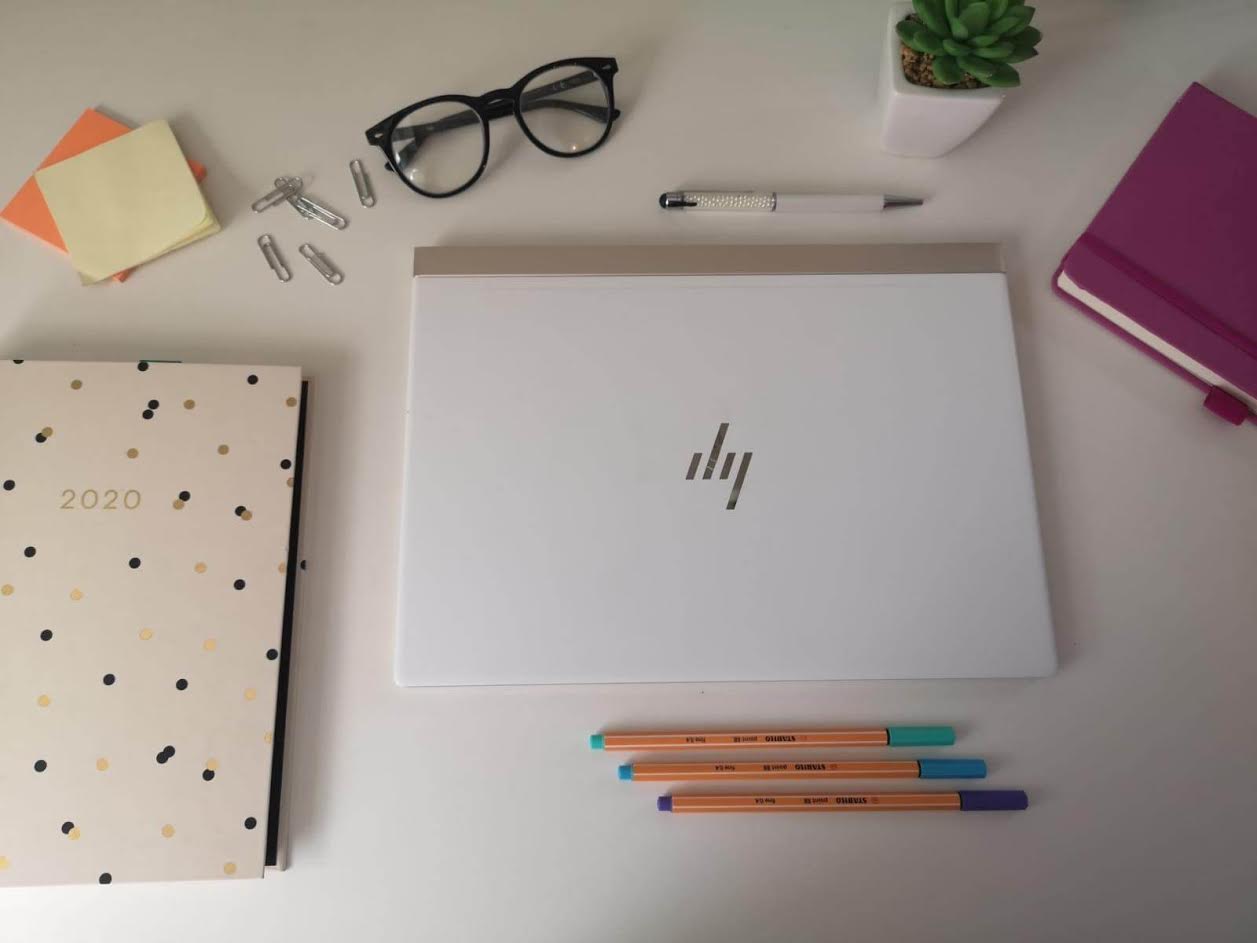
(Photo credit Anđelka Rihatarić)
For headmaster Rihtarić, this situation is a necessary evil, but as in every crisis, this is also a chance for growth. "Teachers are learning a great deal during this period, and students in this environment of distance learning take far greater responsibility for their own learning, for their own success, for planning their day and learning."
When it comes to her job, she works longer hours and in a more demanding environment than usual. In addition to all the regular tasks that she performs, such as daily communication with the competent, official correspondence, planning, and communication with teachers and professional assistants, as well as with parents, she is taking care of the necessary maintenance of the school premises. As a principal, she is obligated to monitor and inspect distance learning. "But that laughter, that youth and courage of our students, that persistence and caring of our parents, that dedication and dedication of most of our teachers - all help me to feel only physical fatigue after 10-12 hours of work. Not spiritual."
If you paid attention, all those people are doing more than is required from them to do; web page, video lectures, friendly advice and support, one-on-one Zoom meetings, and many more. I feel like I shouldn't say anything more but rather let their words and actions speak for themselves. A lot of things stopped, but education is one of the things that can't be put on hold.
For the latest TCN coverage on all aspects of the coronavirus crisis in Croatia, follow out dedicated section.
Online Schooling in Croatia, a Pupil's View: Taliah (11) Video Interviews Hannah (13)
April 7, 2020 - Online schooling in Croatia is the new corona reality, but what is it like? The first of two videos interviews though the eyes of two schoolchildren, TCN Junior and TCN Most Junior.
"Dad, you are working really, really hard. How can we help?"
The corona era might be a global disaster on so many fronts, but it does have its small clouds with silver linings.
One of them - for me at least - has been how the crisis has brought the core family unit of four of us much closer together.
My wife Miranda and two daughters, Hannah (13) and Taliah (11), make most of the important decisions in the family, as we explored recently in the division of the 20 rolls of toilet paper that the family went into self-isolation with. Read more on how many rolls the only boy in the family comes out with in Toilet Paper, Toilet Paper, My Kingdom for Some Toilet Paper.
When school closed down for a fortnight recently, we had a big decision to make. Did we stay in our house in a village in Varazdin, or head back to Jelsa on Hvar, where our previous home turned holiday home, turned cancelled bookings was a much better option. Dalmatian sun, the terrace, the Adriatic.
Of course, if we were to go to the island, we would have to employ strict self-isolation. The reality was that this was going to take longer than 2 weeks for sure, perhaps two months, perhaps longer. To be cooped up in the house in the village near Varazdin, or to at least be able to enjoy the sun, the terrace and the view of the Adriatic.
We held a family summit, and we all agreed - let's go to Hvar.
And from that moment, family unity has been magnificent, and I am so proud of all three of them. Mum managed somehow to pack everything up and squeeze it into the car, not knowing how long we would be gone. We have everything we need. We drove to Drvenik to try and make the ferry to Sucuraj, and with Taliah's GPS updates, we made it with 7 minutes to spare.
And since then, I have not met anyone outside the family, chained to my laptop on the couch for 16 hours a day on average, with 30 priceless minutes by the sea to rescue my sanity.
The girls have been magnificent, and it can't be easy for them, especially now that online schooling in Croatia is the new norm - a totally new concept.
"You know, you could help. How about writing a blog about online schooling in Croatia, from the pupil's point of view?"
"Hmmm, cool idea - leave it with us."
I heard a lot of giggling and stop, start interview questions in the next room as I reported on the latest corona deaths in Croatia in real time.
And then, two audio interviews in my WhatsApp inbox - Hannah interviewed by Taliah, and Taliah interviewed by Hannah.
Not to be left out, Mum got the camera out and started to film some footage to turn the interviews into a video report worthy of inclusion on the new Rplus platform - the editing is all her own. A little translation help from star TCN intern Janja Sestak for the subtitles and all was ready.
All it needed now was Daddy Bradders to add the words to deliver the first truly Team Bradders production.
So how is online schooling in Croatia? Today, Taliah interviews Hannah, and tomorrow Hannah will interview Taliah.
Bravo girls, I am beyond proud.
For the latest on the coronavirus crisis in Croatia, check out the dedicated TCN section.
Online Schooling in Croatia Due to Coronavirus: A Teacher's Viewpoint
March 19, 2020 - Online schooling in Croatia has replaced regular school for an initial two weeks due to the coronavirus crisis. Some reflections from the viewpoint of a dedicated teacher.
When a letter arrived from the Ministry of Science and Education last week to start distance education in Istria from Monday, we knew what was waiting for us in other parts of Croatia.
We quickly decided on which platform to use for online teaching at our school, added students and teachers to virtual classes, lent tablets and mobile cards to students from low-income families so that everyone could successfully follow classes with the help of ICT.
Helping each other out, we prepared first-hand teaching materials and devised backup plans and strategies to work from home every day. New circumstances imposed new rules and made us turn into teachers on the other side of the screen overnight.
Unfortunately, many colleagues from other schools still need to be present at schools in their workplaces. These are still unbelievable instructions by competent ministry directors. Every presentation, departure, and commute to work increases the risk of infection, and someone above us just can't figure it out.
And while one education adviser says 150,000 students have forgotten their passwords and crashed virtual platforms that students cannot log in to, it is simply a well-known situation that we teachers relive year after year, for example, when printing student certificates. And while they boast that we do so much better than other wealthier countries, I have to admit that I'm not so sure about that. My colleagues in Norway tell me that they have no problems with logging in to the system all day. A colleague from Turkey is surprised that in this situation, we are still required to be at work. They, too, are tired just like us, but at least their education ministers do not tell them that they have to come to school to learn to work online and, in collaboration with colleagues, be better prepared to work from home.
In communication with students, I see how frustrated many are that they are unsuccessfully trying to login to a system that has never been designed to handle such traffic and workload. My cellphone rings and messages come from all over, and I just can't help the students and their parents with any login issues. I try to calm them down, as always, and as the days go by, we will already get used to these existing problems.
Fortunately, I work in two small schools where we continue to encourage each other and share experiences, just as we do in teaching groups on social networks where we are from all over Croatia. We are aware that online teaching will not be as good as teaching in normal circumstances, but we do our best.
Although behind-the-scenes, friendly, kind and willing to help, we're still here for our students who may miss a class (be it on TV or in a virtual classroom), but we're sure everyone will get more important life lessons not written down in school books.
The views expressed in this article are solely mine and do not represent the views of either of the two schools in which I work.
For the latest on the coronavirus crisis, follow the dedicated TCN section.


